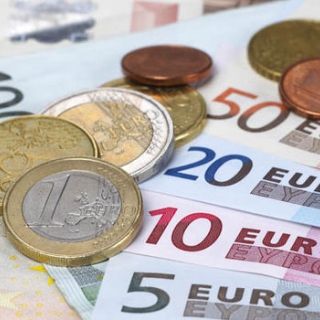


The euro strengthened on Wednesday ahead of a French no-confidence vote, while the Australian dollar fell to a four-month low on slowing economic growth and gains resumed after South Korea's president resigned after declaring martial law.
The European common currency held steady at $1.0512 and 82.90 pence ahead of a vote by French lawmakers on a no-confidence motion that is almost certain to topple Prime Minister Michel Barnier's fragile coalition.
The debate is due to begin at 4 p.m. in Paris (1500 GMT), with a vote expected about three hours later, parliamentary officials said.
Barnier's dismissal would deepen the political crisis in the euro zone's second-largest economy, and could further weigh on the euro, which has fallen sharply since Donald Trump's victory in the U.S. presidential election.
"Unfavorable political developments in France continue to pose downside risks to the euro although they are not necessarily enough to trigger further declines," analysts at MUFG said.
Euro watchers are also looking ahead to comments from ECB President Christine Lagarde later in the day.
Earlier on Wednesday, the Australian dollar slumped as much as 1.22% to its lowest since Aug. 4 at $0.6408 after data showed the economy grew at its slowest annual pace since the pandemic in the third quarter.
Markets are fully pricing in a rate cut next April from a previous 73% and the currency was last at $0.6429.
"Weak annual growth in spending and ongoing pressure on household disposable incomes - even with ongoing tax cuts - point to a weaker fundamental picture," said Pat Bustamente, senior economist at Westpac.
Attention is also on South Korea's victory, which regained ground on Wednesday after plunging overnight following President Yoon Suk Yeol's declaration of martial law, which was rescinded hours later.
The dollar was last down 0.7% at 1,414 won, having jumped 1.6% overnight. But politics remain in focus and South Korean lawmakers on Wednesday called on Yoon to resign or face impeachment.
Traders said the country's central bank may have supported the won at the open on Wednesday by selling dollars.
"In the short term, you have to think it's going to be hard for the won to do well: (There's) a poor structural backdrop, the domestic economy looks weak, you have a central bank that is likely to come in and do more (easing) than previously expected, and on top of that, political malaise," said Rob Carnell, ING's regional head of research for Asia-Pacific.
"The fact that the dollar generally looks stronger than others by default (makes it) almost a perfect storm."
The dollar also gained against the Japanese yen, which rose 0.5% to 150.43, after media reports that cast doubt on market expectations that the Bank of Japan will raise interest rates this month caused government bond yields to fall. [JP/]
In dollar-specific developments, the currency found some support on Tuesday after data showed U.S. job openings rose modestly in October while layoffs fell, even as Federal Reserve officials on the day offered no firm guidance on what they intend to do at the conclusion of their next policy meeting in two weeks' time.
Traders await monthly payrolls data on Friday for further clues on the outlook for interest rates, while the private payrolls report due on Wednesday will provide a preview.
The market-implied chance of a quarter-point rate cut on Dec. 18 was last at 75%, according to the CME's FedWatch Tool.
The pound was flat at $1.2674, ahead of Bank of England Governor Andrew Bailey's remarks.
Source: Investing.com
The US dollar weakened at the start of the week after tensions between the United States and the European Union escalated over the Greenland issue. Markets assessed that the political conflict, which ...
EUR/USD loses ground for the sixth consecutive day on Wednesday, trading below 1.1730 after peaking above 1.1800 last week. The pair struggles amid a moderate US Dollar (USD) rebound following the rel...
The EUR/USD pair moved steadily around 1.1750 during Wednesday's Asian session. Its movement appeared to be holding up after a sharp drop the previous day from its highest level since September 24th. ...
The euro rebounded above $1.16, reaching its strongest level since mid-November, as investors adopted a cautious stance ahead of key Eurozone and US economic data that could influence interest rate ex...
The EUR/USD pair traded flat on Thursday, trading around 1.1596, as market liquidity thinned during the US Thanksgiving holiday. Despite the limited movement, pressure on the US dollar remained as exp...
Gold prices briefly caused a stir after hitting a new record, but then slowed. The main trigger: US President Donald Trump withheld the threat of tariffs on Europe and claimed there was a "framework" for a future agreement on Greenland. This calmer...
Oil prices were little changed in Asian trading on Thursday after US President Donald Trump backed down from a threat to impose tariffs on European countries over Greenland. This decision helped ease geopolitical tensions and improve market...
The Nikkei 225 Index climbed 1.73% to close at 53,689, while the broader Topix Index rose 0.74% to 3,616 on Thursday, snapping a five-day losing streak as Japanese shares were lifted by a strong rally in chip and artificial intelligence related...